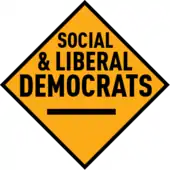1988 Social and Liberal Democrats leadership election
The 1988 Social and Liberal Democrats leadership election was called in the United Kingdom following the formation of the then Social and Liberal Democrats (later shortening their name to "Liberal Democrats"). It was intended to replace the two interim leaders, David Steel and Robert Maclennan, with a single figurehead better able to represent both the former members of the Liberal Party and of the Social Democratic Party.
 | |||||||||||||
| |||||||||||||
| |||||||||||||
| |||||||||||||
There were two candidates and all members of the party were balloted using the Alternative Vote preference system. The election was won by Paddy Ashdown, who served as leader until his stepping down in 1999. The campaign occurred in a party which was still coping with the merger and saw a vituperative attack on Ashdown in a letter written by Alex Carlile, a Beith-supporting MP.[1]
Leadership campaign
Merger and after
The build-up to the leadership campaign began as soon as the party was formally merged in March 1988 — David Steel had made it clear that he did not want to continue as leader after the struggles of the Alliance days, plus he had already led the Liberals for over a decade, and David Owen had entered the political wilderness. At that stage in the party's development, there were still serious divisions between former Liberals and former SDP members.
Potential candidates for the leadership were identified almost immediately. Paddy Ashdown was already well known in the party before he became an MP in 1983, mainly as a result of the Youth Charter he formulated as a result of his experience of working with unemployed youngsters. His unusual background (for a Liberal) as a soldier and diplomat also attracted attention. Once elected, he quickly made a name for himself as someone who was not scared to say what he thought, frequently got into trouble as a result of indiscreet conversations with the press, and displayed boundless, indefatigable energy. He was widely recognised within and outwith the party as someone to keep a (wary) eye on.
Alan Beith was a complete contrast — a quiet Methodist lay-preacher, he embodied traditional Liberal values and beliefs and was seen as someone who would guard the Liberals' political integrity. He was also a very strong Parliamentary performer. Other potential candidates talked about within the party and mentioned by the press and media were Russell Johnston, Malcolm Bruce and Robert Maclennan, briefly leader of the SDP at the time of merger. In the end, however, they all decided not to stand and Bruce became Chair of Ashdown's campaign. David Steel, as outgoing Liberal leader, and Jim Wallace, as Chief Whip, stayed strictly neutral throughout the campaign.
The election was an all-member ballot using the alternative vote system. This was a unique method for electing a leader among the major political parties in the UK. In both the Labour and Conservative parties, leaders were (and still are) elected by MPs and other sections of the party using electoral colleges, and in the case of the Conservatives, a complicated series of ballots. The one-member one-vote system of election used in the Liberal Democrats' 1988 leadership election attracted considerable attention from the press because of this.
As with the 1999 election, there was an artificial "cold war" period before the serious election period started, but as there was no moratorium on campaigning before the official campaign, the period was used for intensive behind-the-scenes negotiations with potential supporters. Because of the recent merger, it was seen as essential for leadership candidates to have support from ex-SDP members as well as ex-Liberals. Both teams also spent their time planning their press and media strategies, the timetable for keynote speeches and hustings, and general publicity.
Just before the real contest started, Alan Beith's campaign got off to an unfortunate start when one of his supporters — reputedly Alex Carlile released a list of fifteen reasons why Ashdown was not fit to be elected. Beith eventually condemned the letter after intervention from David Steel and other senior party members, but the move had introduced a sour note.
Candidates
At the close of nominations on the 24 June 1988, the following had been successfully nominated.
Paddy Ashdown
Supporters included:
- MPs: Malcolm Bruce, Archy Kirkwood, Matthew Taylor, Richard Livsey, Ronnie Fearn, Menzies Campbell. Leading SDP supporters included Tom McNally (formerly Jim Callaghan's speechwriter), Lindsay Granshaw, Anne Sofer, Denis Sullivan, David Marquand, Roy Jenkins, Shirley Williams
- Other notable supporters: Timothy Clement-Jones (Past Chair of the Liberal Party), Des Wilson (Campaigner for Social Justice), Alan Leaman (Co-author of the Youth Charter)
Alan Beith
Supporters included:
- MPs: Geraint Howells, Cyril Smith, Alex Carlile, David Alton
- Lords: Lord Mackie
- Other notable supporters: Richard Wainwright (former Liberal MP), Annette Penhaligon (Widow of David Penhaligon MP and influential figure in the Liberal Party), Andrew Gifford (David Steel's Head of Office), Rev. Roger Roberts (Influential Welsh Liberal)
Results
| Candidate | Votes | % | |
|---|---|---|---|
| Paddy Ashdown |
41,401 | 71 | |
| Alan Beith | 16,202 | 29 | |
| Turnout | 57,790 | 71.9 | |
References
- "1988 Leadership Campaign" (PDF). liberalhistory.org.uk.
Bibliography
- Issue 24 of the Journal of Liberal History contains an article by Harriet Smith about the campaign
- Colin Rosenstiel. "All-member ballot results". Liberal Democrats' election results 1998-2004. Retrieved 2006-01-10.

.jpg.webp)